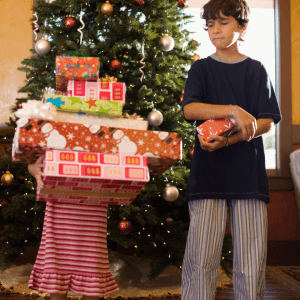
Christmas Isn’t Always Fun for Kids in Care
Using the words and phrases of children and young people in Out of Home Care, Noel MacNamara explores their experiences of the holiday season, highlighting that Christmas isn't always fun for kids in care.
This article was written by Noel MacNamara, Executive Manager, Research & Policy at the Australian Childhood Foundation and Deputy Director, Centre for Excellence in Therapeutic Care
It’s all too easy to get wrapped up in the fun and happiness of Christmas and forget that, for others, the season isn’t necessarily a joyful one. For some of our children, Christmas has not been a happy time and can bring back difficult memories. Arguments, violence or aggression in the home, strangers or police coming to the house, parents sleeping through Christmas to sleep off the effects of alcohol or drugs, getting no presents or presents going missing, no food and so on.
In this blog, I will explore, using the words and phrases of children and young people in foster and kinship care, their experiences of the holiday season, alongside some recommendations for how parents and carers can respond.
I don’t like Christmas; can we not do it this year?
How might you handle this:
- Don’t force Christmas on your foster/kinship child –It’s important to have a clear understanding of your child’s wishes at Christmastime. It may be that they have little interest or enthusiasm for getting involved in the festivities, so don’t try to force or overload them if they don’t seem up to it.
- Plan Christmas with them, so they know what is going to happen. This may reduce their fears and make them feel a part of the festivities. It may be helpful to drip-fed over the six weeks leading up to Christmas. Be prepared to change the plan!
- If friends, relatives or guests are coming, it’s helpful if they are already known, or are talked about before Christmas to show how well you know them.
- If children have come from houses where alcohol misuse has occurred, perhaps no alcohol should be consumed at all, or at least not until after the children have gone to bed.
- Reassure the younger ones that your family always ensures everyone gets some presents on Christmas day. Let them help you buy gifts for others to demonstrate this.
- For those who worry about the food, involve them in choosing the menu may help. Or let them come on the grocery shop or help you unpack Christmas shopping.
I don’t celebrate Christmas?
This can be a complicated issue for carers who are caring for children who follow different religions, and one that never has a one-size-fits-all solution.
How might you handle this:
- Naturally, as the carer, it will fall to you to make compromises if a child in your care follows a religion which doesn’t recognise Christmas you should try to be respectful and sensitive to this issue.
- If it’s the other way around and the child is from a Christian background, some Christmas celebrations should be enjoyed, but you can introduce elements of your own faith as a way to promote multiculturalism in your household.
How will Santa find me?
 There are some questions that often crop up for foster/kinship carers when Christmas decorations start appearing in the shops. These include: ‘Will I be staying for Christmas? How will Santa find me if I’m not at home? For a child in the care of others these questions are important. They may be a sign of bigger questions, like ‘will I ever go home again?’, while others are just ensuring they don’t miss out on a present.
There are some questions that often crop up for foster/kinship carers when Christmas decorations start appearing in the shops. These include: ‘Will I be staying for Christmas? How will Santa find me if I’m not at home? For a child in the care of others these questions are important. They may be a sign of bigger questions, like ‘will I ever go home again?’, while others are just ensuring they don’t miss out on a present.
How might you handle this:
- If the plan is unclear, contact the foster care agency/CPS and try to find out whether the child will definitely be staying for Christmas. Don’t delay. Uncertainty is highly de-stabilising for any child but a child in care is already on shaky ground.
- With young children we help them to write to Santa with their Christmas wishes and include their new address. You can send a return letter confirming that Santa is fully aware.
I’m going to ruin Christmas
Children can deliberately disrupt Christmas by isolating themselves or breaking the gifts lovingly purchased for them or generally trying to spoil the day for others.
This is often a sign of deep emotional painful feelings breaking to the surface. Children will react the only way they know how or have been accustomed to.
How might you handle this:
- Try to be tolerant and understanding
- Allow them to relax and calm down
- Be supportive
- Try to distract them into another activity
- Act the fool and be silly – break down barriers to re-connection
Is it OK that I am here for your Christmas?
Some older children may worry about imposing, because there is a perception that it is your house, so your special time. A child should not feel pressurised to participate, nor left out.
How might you handle this:
- Writing all the children’s names onto Christmas decorations this can provide a sense of belonging and inclusion, much like having their picture on the wall and their name on a plate on their bedroom door. Sometimes the small wordless gestures say so much.
Will Santa give my brother better presents than me?
 Christmas can be a time of emotional turmoil, some children will be checking (not only at Christmas but all year) if the person caring for them likes or loves a sibling more than them.
Christmas can be a time of emotional turmoil, some children will be checking (not only at Christmas but all year) if the person caring for them likes or loves a sibling more than them.
How you might handle this:
- Always try to secure some alone time with each child in your care. It communicates a lot about your desire to hang out with them and can create a sense of value and self-esteem. Even in a busy house, rotating who can be the helper in a task, like cupcake making, can carve out special moments.
- Ensure that there is equity between the children in terms of presents.
What do you normally do at Christmas?
This is a great question. It helps us to explain some of the routines and fun things that can be done at Christmas. Some children will think the way you celebrate is ‘lame’, but others will want to join in.
Some children may have traditions which they like to stick to, so try to accommodate these so their routine can carry on as normal as possible.
My family will be sad at Christmas without me.
This is a common fear for many children and young people. They may show it in different words or through a variety of behaviours. Actually saying: ‘I will be sad at Christmas without my family,’ might be a bit too personal and difficult for them to say out loud but they remain concerned about a parent or other family member.
How you might handle this:
 Where appropriate and safe, you could use family contact, via phone calls or Zoom, on Christmas day. We have also found involving parents in the run-up to Christmas, such as school play and celebrations, has been a good way to encourage positive, managed involvement. If you agree to do a contact phone call – makes sure it happens at the appointed time. Some parents are counting down to the last second for the phone to ring. It is also important to manage the call because the stress associated with Christmas and their child being in care may have resulted in the parents relying on former ways to cope. It is also important to help the child manage their excitement and anticipation.
Where appropriate and safe, you could use family contact, via phone calls or Zoom, on Christmas day. We have also found involving parents in the run-up to Christmas, such as school play and celebrations, has been a good way to encourage positive, managed involvement. If you agree to do a contact phone call – makes sure it happens at the appointed time. Some parents are counting down to the last second for the phone to ring. It is also important to manage the call because the stress associated with Christmas and their child being in care may have resulted in the parents relying on former ways to cope. It is also important to help the child manage their excitement and anticipation.
If there’s a good relationship between you and the child’s parent, arranging how to handle Christmas can ensure they are on board and upbeat. This reassures the children. Having a pre-Christmas access visit with families can provide children with their own family celebration.
I hate Christmas.
We have known children try to sabotage Christmas and break new and much longed-for toys. Others may separate themselves from the day, not wanting to join in or feeling suddenly overwhelmed.
How you might handle this:
- Don’t overreact, remember this is an outward sign of painful emotions. Show you understand by giving them time and attention after they cool off. Don’t rush them.
- Sometimes trying to draw them into a movie or a new game will transition them into reconnecting with others. Sometimes hot chocolate, lollies and downright silliness can hit the reset button for a young person to re-engage with festivities too. You know your child; you will find a way.
Merry Christmas!
Christmas day will be a voyage of discovery.
Some important questions to ask yourself before Christmas morning include:
- Have you all the batteries you will need? The item may get thrown away if it is perceived to be broken.
- Does anything need putting together? Impulsive children cannot wait long.
- Do you need scissors to undo packaging before the kids start attacking it with their teeth?
How you might handle this:
Be prepared for tears and laughter, arguments and playing nicely, to all happen intermittently during the day. It goes with the territory. Do the best you can with trying to make the dinner, while supervising numerous children and fielding arguments. Even if it burns a bit around the edges, it will all get eaten.
I’m bored!
A day or two after the big day those fearsome words may be uttered. Boredom is a danger zone. When children are bored, their levels of worry and  disruptive behaviours may increase.
disruptive behaviours may increase.
How you might handle this:
You can provide options for safe activities (e.g., outside play, blocks, modelling clay, art, music, games) and involve children in brainstorming other creative ideas. Children need ample time to engage in play and other joyful or learning experiences
Finally, sit down, enjoy some silence, comforted by the fact that it’s all over for another year.
The children in your care depend on your well-being. Caregivers must take care of themselves, so they have the internal resources to care for others. To this end, caregivers can engage in self-care by staying connected to social supports, getting enough rest, and taking time for restorative activities (e.g., exercise, meditation, reading, outdoor activities, prayer). Seeking help from your Care Team is also an important option.
🧡 This Christmas, we’re offering our supporters the chance to change the trajectory of a vulnerable child’s life by buying them a Little Hearts Healing Kit 🎁
Every Little Hearts Healing Kit will be tailored to the needs of each child, based on their age, experiences and requirements for healing. Having access to these items and activities means that children will be able to process their trauma within the comfort and safety of their new home and in the presence of a loving caregiver.
If you’re in a position to purchase a Little Hearts Healing Kit today—or even just contribute towards one Kit—we would be most grateful. You can learn more about the Little Hearts Healing Kit here.
